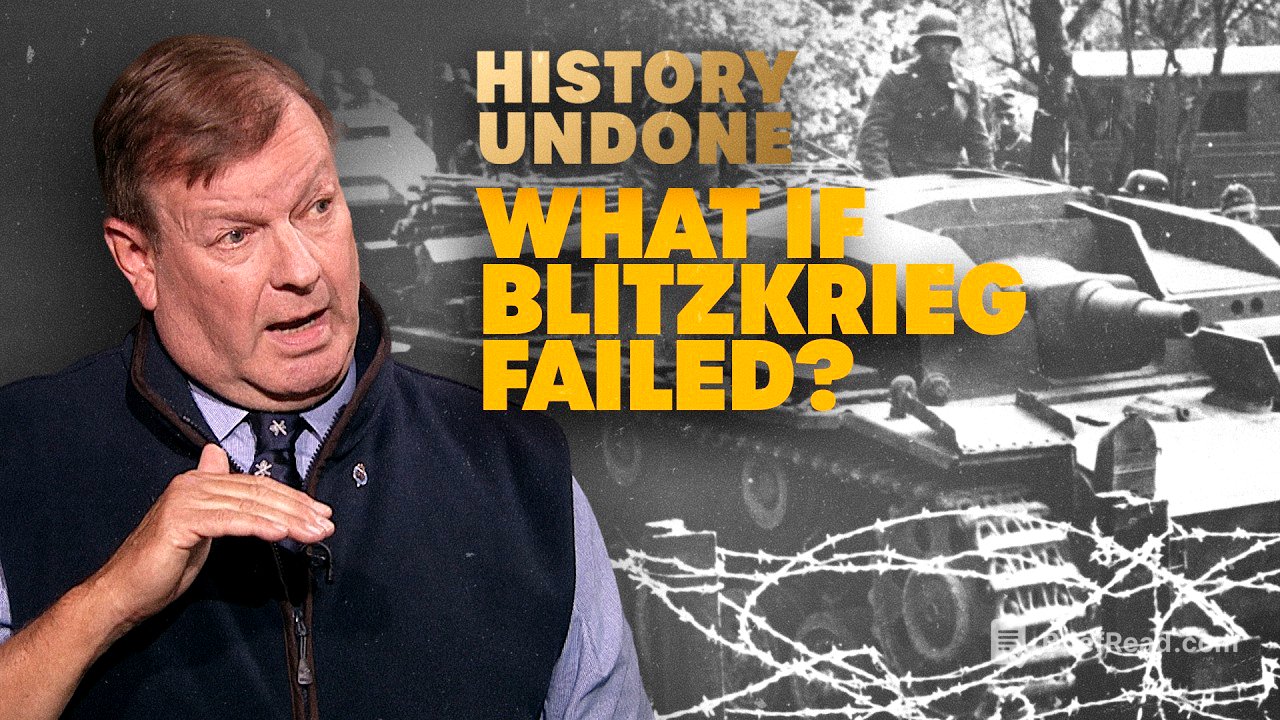TLDR;
This episode of History Undone discusses the German Blitzkrieg, particularly focusing on the fall of the Western Front in 1940. It challenges the conventional understanding of Blitzkrieg as a uniquely German military doctrine, arguing it was more of a synthesis of existing maneuver warfare and combined arms tactics enhanced by modern technology like radios and aviation. The discussion covers the invasion of Poland, Denmark, Norway, and the pivotal campaign in France, questioning whether the success of Blitzkrieg was inevitable. The experts explore alternative scenarios where Allied resistance could have blunted the German advance, and the potential long-term consequences of such a failure, including a possible coup in Germany, Stalin's expansionist moves, and a different trajectory for World War II.
- Blitzkrieg was not a uniquely German invention but a synthesis of existing military theories and technologies.
- The success of Blitzkrieg in France was not inevitable and could have been thwarted by stronger Allied resistance.
- A failure of Blitzkrieg could have led to a military coup in Germany and altered the course of World War II.
Intro [0:00]
The video introduces the concept of Blitzkrieg, or "lightning war," as a rapid, heavily mobile form of warfare employed by Nazi Germany during World War II. It highlights the devastating impact of Blitzkrieg in the invasions of Poland in 1939 and several Western European countries in 1940, as well as its initial successes against the Soviet Union. The episode aims to explore whether the outcome of World War II could have been significantly different if the Blitzkrieg strategy had not been so effective.
What is Blitzkrieg? [2:16]
Chris Copson defines Blitzkrieg as a synthesis of military theories from the 1920s and 1930s, combining maneuver warfare with combined arms operations. He emphasizes the importance of armor, artillery, and aircraft working together to create a breakthrough in the enemy's line of defense, bypassing strong points to cause chaos and confusion. Chris Parry argues that Blitzkrieg is a myth, a journalistic term not used by the Germans themselves. He describes it as combined arms and maneuver warfare, emphasizing the importance of rapid decision-making, communication through radios, and mission command. Parry also highlights the German focus on sustaining operations longer than the enemy, using tactics and drugs to maintain momentum.
Allied Misconceptions and German Advantages [6:51]
The discussion shifts to the Allied perspective, noting that the Allies were fighting the war with a mindset rooted in World War I trench warfare, which left them vulnerable to the innovative German tactics. The French, in particular, were focused on a defensive strategy, exemplified by the Maginot Line, and were slow to adopt armored warfare concepts advocated by figures like Charles de Gaulle. The experts highlight that the Germans redesigned their army with an emphasis on the tank core and had superior communications, logistics, and aviation capabilities.
Invasion of Poland, Denmark, and Norway [11:23]
The conversation addresses the invasion of Poland, with Chris Parry asserting that it was not a typical Blitzkrieg operation but rather an infantry-heavy mass attack that overwhelmed the Polish forces. He notes the absence of decisive armored warfare in the Polish campaign. Chris Copson then discusses the invasions of Denmark and Norway, highlighting that Denmark fell easily due to its small army, while Norway proved to be a difficult campaign for the Germans due to terrain and determined resistance.
The Fall of France [14:30]
The discussion focuses on the Western Front, particularly the invasion of France. Chris Parry outlines the German plan, which involved a feint through the Netherlands and Belgium to draw the Allied forces north, while a large armored thrust would penetrate through the Ardennes Forest to reach the coast, encircling the Allied armies. He notes that the French had dismissed the possibility of a major attack through the Ardennes and failed to act on intelligence suggesting a German buildup in the area. Chris Copson explains that the French were committed to a defensive plan, which was ill-suited to counter the rapid German offensive.
German Offensive Operations [22:41]
Chris Parry describes the German offensive, known as the "sickle cut," which involved a thrust through Belgium and the Netherlands, followed by an armored advance through the Ardennes. He notes that the Luftwaffe played a critical role in disrupting French formations and destroying artillery. The French attempted to counterattack, but their efforts were hampered by a lack of air and artillery support. Chris Copson adds that the French 9th Army, composed of reservists, was unable to cope with modern armored warfare. He highlights the rapid advance of Rommel's 7th Panzer Division, which became known as the "Ghost Division" due to its speed and unexpected location.
The Battle of Arras and the Halt Order [29:43]
The discussion turns to the Battle of Arras, a British counterattack that briefly disrupted the German advance. Chris Parry explains that the attack, though initially successful, lacked sufficient air and artillery support. Chris Copson notes that the attack caused panic among the German high command and led Hitler to issue a halt order, which allowed the British Expeditionary Force and French forces to retreat to Dunkirk. Parry suggests that the halt order was influenced by concerns among German generals about fuel shortages, maintenance requirements, and the need to deal with remaining French forces to the south.
The Fall of Paris and the Armistice [33:49]
Chris Parry notes that Paris fell on June 14, and the French surrendered on June 22. He suggests that the German momentum had run out of steam, and the French army was demoralized. The French high command feared a communist takeover and sought an armistice to prevent a breakdown of law and order.
What If Blitzkrieg Had Played Out Differently? [37:13]
The experts explore alternative scenarios in which the Blitzkrieg campaign could have played out differently. Chris Copson suggests that if the Allies had anticipated the German attack through the Ardennes and had better defended the Meuse River, they could have held up the German advance. Chris Parry emphasizes the importance of French psychology and the need to assume that the Ardennes was a possible route of attack. He also highlights the German dominance in the air and the impact of anti-aircraft fire on Allied aircraft.
Long-Term Consequences of a Failed Blitzkrieg [49:59]
The discussion shifts to the long-term consequences of a failed Blitzkrieg. Chris Parry suggests that the initial political intention of the Blitzkrieg was to push the French back to a point where they would seek an armistice and convince Britain to come to the peace table. Chris Copson believes that if the German army had been fought to a standstill, Italy might not have joined the war. Parry proposes that a failed Blitzkrieg could have led to a military coup in Germany, with the German army overthrowing Hitler. Copson raises the possibility of Stalin exploiting the situation by seizing more of Poland and expanding into the Baltics and Balkans. The experts also consider whether Churchill would have remained in power and whether Britain would have continued the war.







![[사나의 냉터뷰] 사나 언니 홀리러 온 아기 고양이 닝닝🐈⬛l EP.11 에스파 닝닝 편](https://wm-img.halpindev.com/p-briefread_c-10_b-10/urlb/aHR0cDovL2ltZy55b3V0dWJlLmNvbS92aS9NWjZyUjVYUm1XZy9ocWRlZmF1bHQuanBn.jpg)

